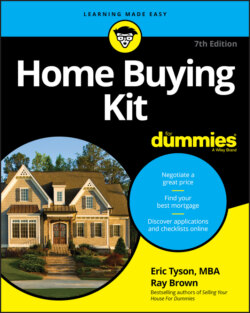Читать книгу Home Buying Kit For Dummies - Eric Tyson - Страница 58
Insurance
ОглавлениеWhen you purchase a home, your mortgage lender almost surely won’t allow you to close the purchase until you demonstrate that you have proper homeowners insurance. Lenders aren’t being paternalistic, but self-interested. You see, if you buy the home and make a down payment of, say, 20 percent of the purchase price, the lender is putting up the other 80 percent of the purchase price. So if the home burns to the ground and is a total loss, the lender has more invested financially than you do. In most states, your home is the lender’s security for the loan.
Some lenders, in years past, learned the hard way that some homeowners may not care about losing their homes. In some cases, where homes were total losses, homeowners with little financial stake in the property and insufficient insurance coverage simply walked away from the problem and left the lender with the financial mess. Because of cases like this, almost all lenders today require you to purchase private mortgage insurance (PMI) if you put down less than 20 percent of the purchase price when you buy. (We discuss PMI further later in this chapter, in the section titled “The 20 percent solution.”)
When you buy a home, you should want to protect your investment in the property (as well as cover the not-so-inconsequential cost of replacing your personal property, if it’s ever damaged or stolen). In short order, your clothing, furniture, kitchen appliances, and beer-can collection can tally up to a lot of dollars to replace.
When you purchase homeowners insurance, you should buy the most comprehensive coverage that you can and take the highest deductible that you can afford to help minimize the cost. In Chapter 13, we explain how to do all that. To estimate what homeowners insurance may cost you, we suggest you contact some of the insurers we recommend in Chapter 13. Explain to them what type and price range of properties you’re considering buying in which communities (zip codes), and they should be able to give you a ballpark monthly cost estimate for insurance. Calling insurance agents now also enables you to begin to evaluate which insurers offer the service and coverage you desire when the time comes to actually buy your dream home.
Just as you should do when you shop for a car, get quotes on insuring properties as you evaluate them, or ask current owners what they pay for their coverage. (Just remember that some homeowners overpay or don’t buy the right kind of protection, so don’t take what they pay as gospel.) If you overlook insurance costs until after you agree to buy a property, you can be in for a rude awakening.
| Item | Estimated Monthly Expense |
| Mortgage payment | $ |
| Property taxes | + $ |
| Insurance | + $ |
| Improvements, maintenance, and other | + $ |
| Homeownership expenses (pretax) | = $ |
| Tax savings | – $ |
| Homeownership expenses (after tax benefits) | = $ |
